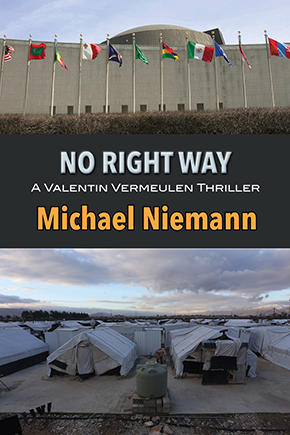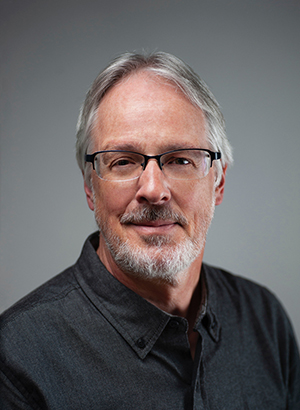 The fourth installment in Michael Niemann's Valentin Vermeulen thriller series was published this week. No Right Way moves Vermeulen's investigatory brilliance out of Africa and into Turkey, a country doing its best to deal with the tidal wave of refugees from the civil war in Syria.
The fourth installment in Michael Niemann's Valentin Vermeulen thriller series was published this week. No Right Way moves Vermeulen's investigatory brilliance out of Africa and into Turkey, a country doing its best to deal with the tidal wave of refugees from the civil war in Syria.
No Right Way starts in the fall of 2015, four years after the start of Syria's Civil war; ISIS (referred to as 'Daesh,' it's Arabic name, in the novel) has controlled much of the country for over a year, prompting a tidal wave of refugees into Turkey. This puts pressure on the United Nations High Commissioner for Refugees (UNHCR) and various NGOs to act quickly to create refugee camps and set up programs to help the refugees. But nothing done in a hurry is done well, and it's up to Valentin Vermeulen to make sure no fraud is happening.
In my previous reviews of books in this series I focused on the figure of Vermeulen himself. And my review of his third book focused on Niemann's gift for depicting setting and for creating fascinating supporting characters.
Niemann's entire Vermeulen opus has "refugees" as a thematic throughline. When a citizen is compelled to leave the place where he or she was born and formed, where do they go? How do they get there? Earlier books focused on who helps them, with a special emphasis on the strong women who run the NGOs and fight the front-line battles to keep the refugees alive. There was also a focus on who polices refugees, whether UN peacekeepers or local military police.
In this book most of Vermeulen's interactions are with the refugees themselves, especially a young boy, Tariq, and a woman, Rima Ahmadi. We experience the life of the refugee, especially Rima Ahmadi's, a single woman trained as a teacher, now harvesting grapes in the fields near the refugee camp, doing her best to avoid her foremans' aggressive advances, trying to find community in the tent city. There are flashbacks to her life before, which highlight the fact that refugees were once just like those of us who are not displaced: educated, part of a land and community where they were productive, had family, worked to build something. All of which was destroyed. The transition from citizen to refugee also strips them, in the eyes of the outside world, of their humanity.
In an article for Crimereads, Niemann said:
Refugees are a global scandal…. Over the past five hundred years or so, successive political regimes in Europe and the European settler colonies have conjured up the illusion that the world is divided into discrete territorial units governed by a central authority. One of the most pernicious results of this illusion is the notion that every human being must belong to one of these territorial units, be it by birth or blood.
Refugees blow that illusion to smithereens. That’s why they are a scandal. The world’s governments try their best to contain that scandal, sometimes in a benevolent fashion, often not. And still, they keep coming because the very governments complaining about refugees do their level best to create more.
The above sums up the thrust of No Right Way better than I could. But only by reading it will you get Niemann's trademark thrills, and vicariously experience Vermeulen's love of good food and drink (there is a drinking scene that particularly stands out), and of course, a good mystery.

For this review, I decided it was time to interview Niemann himself, and find out more about his process for generating Vermeulen's adventures.
Niemann's day job inspired his writing. Until he retired this month, he was an adjunct professor of International Studies at Southern Oregon University. Before that he taught International Studies and Political Science at Trinity College in Hartford, where he coordinated the African Studies concentration and the Global Studies Concentration.
His first foray into fiction writing was to take a course from his friend, the late author Fred Pfeil. After that Niemann was hooked. He studied with Lucy Ferriss, also at Trinity. "The first serious thing I wrote was inspired by a walk I took on the beach in South Africa, near the Mozambican border. I wandered off the beach into the shrubland and stumbled on these weathered barracks, an abandoned South African army camp from the apartheid era."
Niemann and his wife moved to Ashland, Oregon, in 2008. He quickly found a writing group. When they asked him what he had written, all he had was this idea and a few notes for a short story. He joined the group and wrote the the short story Kosi Bay, published in Mysterical-E.
Niemann has written five novels in just a few years (the fifth is in the publisher's hands). He attributes his steady output to his critique group. "They meet every other Monday for two hours. We have to have twenty pages written every two weeks. We submit the pages the Thursday before the meeting, read everyone else's submissions, and then critique. The authors listen to the critiques and take notes. No backtalk. What they do with the notes is up to the writer." All but the newest member of the group are now published, and all of them write mysteries, though in different genres.
His goal is to write a thousand words a day. "That doesn't always work." His regular writing time is 8:30 to 12:30, and sometimes he goes back to work. If he feels like the ideas don't flow, he leaves his desk at home and tries writing in the library; usually that does the trick. He doesn't believe in writer's block. "Writer's block is a mental construct," he says. "It's really a fear of putting words onto the page. I tell my students, just start putting words on the page. They don't have to make any sense! Once you start typing, the inspiration will follow."
He doesn't write on weekends. "That's the German part of me. Weekends are weekends!"
One of the ways he keeps readers turning the page is to let them know who the bad guy is before the protagonist does. "That created a particular kind of tension," he says, then quotes Ian Fleming: "Never ever have your protagonist sit back and ponder the problems Or make a list of suspects, it just slows things down."
He writes in Scrivener. Every time he starts a new project he pastes his earlier research into his research notes. When he has a draft he has Scrivener read it to him out loud, which leads to a lot of editing. Then he submits it to his writing group.
He writes in sequence and doesn't plot, except for scenes from the beginning, the middle, and the end. Sometimes those earliest scenes will be written years before he writes the book. He didn't know how the third novel and this novel were going to end when he first sat down to write them. "That sometimes causes anxiety," he says, with his typical understatement.
Why is Vermeulen Belgian? "I wanted to write a character who could go all over the world. He had to be multi-lingual. And he had to come from a country with no axe to grind. He couldn't be German or American because these countries still want to throw their weight around. So I picked the smallest country I could, which was Belgium."
Niemann admires the work of John le Carré, Len Deighton, authors he read when he was in his teens. But he wanted a film-James Bond kind of hero who was not a James Bond type. "Because, much as I love reading spy mysteries, they are still steeped in some kind of nationalism, 'for God and Country,' but mostly country and not so much God."
Now he enjoys books like The Old Drift by Zambian author Namwalli Serpell, American author Don Winslow's The Cartel, and Jar City by Icelandic author Arnaldur Indridasun. On the non-fiction front, he's reading The Age of Surveillance Capitalism by Shoshana Zuboff.
Niemann plans a few more Vermeulen books, but he is looking ahead to writing other kinds of stories, stories that won't feature Vermeulen, much to his publisher's horror and this fan's chagrin. But his ideas for future work also sound promising: a thriller set in the US, or even some sci-fi. Whatever he comes up with, we will line up to read it!
You can meet Niemann in person at the following events this summer:
June 15, 2019 @ 2pm Meet and Greet at Rebel Heart Books, 157 W California St, Jacksonville, OR
July 27, 2019 @ 2pm with fellow Coffeetown Press/Camel Press authors Sharon St. George and Clive Rosengren at Barnes & Noble, 1260 Churn Creek Rd., Redding, CA
August 22-25, 2019, at the Killer Nashville Conference in Nashville, Tennessee.
October 6, 2019 Niemann will teach a session "What Crime Writers can learn from Aristotle," at the Write on the Sound conference in Edmonds, WA.
